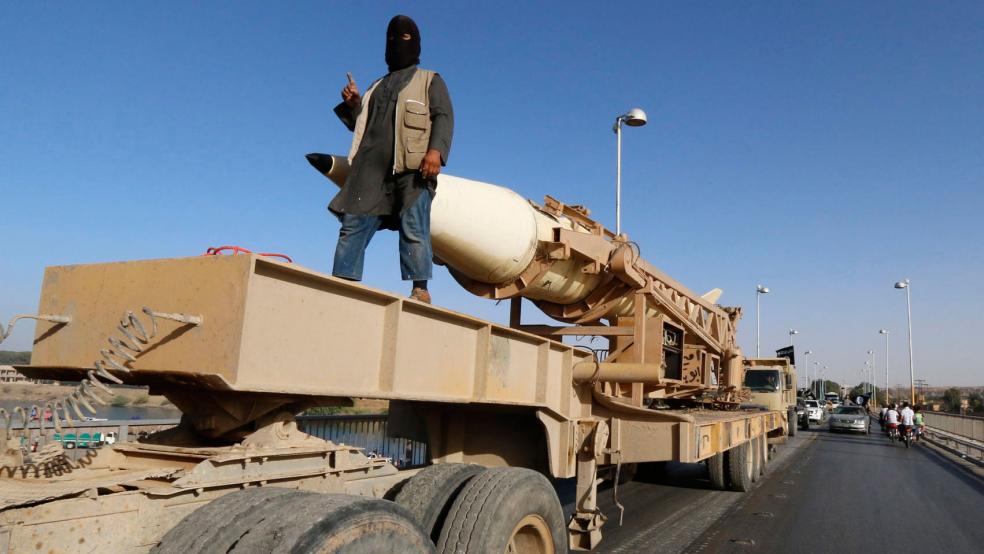The crises in Ukraine and Iraq have little to do with one another. In Ukraine, Russia is exerting its territorial ambitions, while in Iraq, the Islamic State of Iraq and Syria (ISIS) is attempting to build an Islamic caliphate. But both crises do share one key trait -- both campaigns are funded by energy.
In Russia’s case, money from the sale of energy to Europe has paid for Moscow’s rise from the dark days after the fall of the Soviet Union. Right now, Russia supplies one-third of Europe’s gas supplies, and European payments make up some 60 percent of the profits of Gazprom, Russia’s state-owned energy giant.
Related: What ISIS Really Wants (Besides Your Head)
Control over Iraqi oil has allowed ISIS to grow from a band of jihadists to a full-blown terrorist army. The Iraqi Oil Report says the group is generating some $1 million dollars a day in oil sales. Luay al-Khatteeb, a visiting fellow at the Brookings Doha Center, estimates that the group could capture enough of Iraq’s oil structure to generate $730 million this year.
“This wealth has helped expand their operational capacity and incentivized both local and foreign fighters to join them," Sens. Marco Rubio (R-FL) and Bob Casey Jr. (D-PA) wrote to a letter to Secretary of State last week. "ISIS has the resources, weaponry, and operational safe havens to continue to threaten the stability of the region and U.S. national security interests.”
So far, neither crisis has yet to hit energy markets. This Labor Day weekend, gas prices are at their lowest point since 2010. Right now, the national average for a gallon of regular gasoline is $3.45, ten cents cheaper than a year ago.
Analysts don’t expect either crisis to disrupt oil markets significantly in the weeks to come. For Russia, supplying energy to Europe is simply too important for the Russian economy, which has been struggling in the wake of the crisis.
Related: Putin Wants Eastern Ukraine. Let Him Have It
"If you had that playing out in the market, you would not see the stock market at new highs," Jim McDonald, chief investment strategist at Northern Trust, told CNBC. "It's a little nerve wracking. You don't know what (Russian President Vladimir) Putin's end design is here, but there does appear to be some economic constraints on how far and fast they can go right now. They don't look like they're going to disrupt energy supply and that's what concerns the market."
However, both Russia and ISIS’s reliance on oil provides an opportunity: it gives the United States and its allies an opportunity to confront each without military force.
The UN Security Council has already expressed “grave concern” over countries buying oil from ISIS. Iraq’s Oil Ministry also has warned crude oil buyers about purchasing oil from the group. In a recent New York Times op-ed, Patrick B. Johnston and Benjamin Bahney, two researchers at the RAND Corporation, argued that bankrupting the group would be the most effective way of stopping its rise.
Related: How the U.S. Allowed ISIS to Form a Terrorist Army
“Baghdad should also work to strike deals with local Sunni tribes and business owners where ISIS has not yet taken control,” they argued. “These Sunni leaders would cooperate in squeezing ISIS out of local markets in exchange for subsidies and other direct government economic assistance.”
Targeting Russia’s oil industry is much easier. European leaders, who are meeting in Brussels this weekend to discuss new penalties against Russia, could impose sanctions targeted at existing energy deals with Russia. This would force Europe to find energy supplies elsewhere, but it would also serve to quickly empty Russian coffers. This would directly impact Russia’s ruling class that empower President Vladimir Putin.
“Corporations are beginning to have funding problems and the upper middle class is beginning to be hurt by the sanctions,” Edward Goldberg, a professor at Baruch College and the New York University Center for Global Affairs, told The Fiscal Times. “Although Putin's polling of last week remained high, it is easy to speculate that these numbers are based on sand.”
Top Reads from The Fiscal Times:





